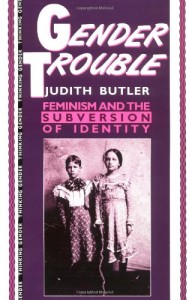 Later this week, we will be hosting a few essays marking the 25th anniversary of Judith Butler’s Gender Trouble: Feminism and the Subversion of Identity
Later this week, we will be hosting a few essays marking the 25th anniversary of Judith Butler’s Gender Trouble: Feminism and the Subversion of Identity
. For a book like Gender Trouble, the 25th anniversary is a meaningful one, as it marks the passage of a particular watershed in the academic lifecycle: many (and possibly most) graduate students in coursework today were born after Butler’s study took the academy by storm.
Of course, reassessments of Gender Trouble and, more often, the cultural and intellectual moment in which it was embedded have already been going on for some time. As Nicholas Dames noted in a 2012 n+1 review-essay, this decade has seen a host of novels reckoning with the various ways that Theory—mostly French Theory but sometimes queer theory as well—intruded into that intricate process of Bildung for a generation (“the Theory Generation” he dubs it, straightforwardly) and now is extruded in that generation’s novels.[1] But where fiction blazes a trail, academia itself follows: also in 2012, Michael Warner wrote a dazzling essay reflecting on the field of queer theory as “a searching and still largely undigested conversation, rich enough to have many branches, some different enough to be incommensurate with one another.”
Warner’s essay is itself a brief exercise in intellectual history of the late ’80s and early ’90s (and quotes from a primary source that I dearly hope makes its way into many monographs to come!), while intellectual history more formally has begun surveying this moment in detail and in earnest. Gender Trouble, though, has not received sustained or consistent attention—probably not a surprise to the many critics of the field who rightly point to gender as a major and continuing blindspot.
What is perhaps most frustrating is that we (speaking for intellectual historians) seem to know full and well that Butler is a major figure and needs to be given a prominent place in the intellectual history of the end of the twentieth century. The two major synoptic intellectual historical studies which cover this period, Daniel Rodgers’s Age of Fracture (2011) and Andrew Hartman’s A War for the Soul of America (2015) both touch upon Butler—Hartman in more substantial detail (his fifth chapter is even called “The Trouble with Gender”). A selection from Gender Trouble made it into the third and fourth editions of David Hollinger and Charles Capper’s The American Intellectual Tradition, but was taken out for the fifth and sixth editions but appears to be back in for the seventh. At this blog, Butler has come up a handful of times—often in connection with one or both of these books—but has not gotten a post devoted to her work apart from Kurt Newman’s magnificent piece riffing on Butler’s much more recent work, Parting Ways (2009). Digging through the blog’s archives, I was led to this review of Rodgers’s Age of Fracture by Nemo at PhD Octopus. It begins “What does Judith Butler have in common with Ronald Reagan? How about Jerry Falwell and John Rawls? Cornel West and Milton Friedman?” Yet this is what, to pick on Rawls, their respective index entries in Age of Fracture look like:
Butler, Judith, 139, 144; Gender Trouble, 163
Rawls, John, 12; A Theory of Justice, 182-187, 189-191, 193-194, 198-199, 209, 220
Ronald Reagan’s index entry is eleven lines long.
This is often the shape of the problem when it comes to figures like Butler, and while the few pieces on Gender Trouble which will appear this week will certainly not rectify the matter, perhaps we can find out about new work—maybe even by those scholars young enough to have been born on the near side of 1990—which will make good on the already-acknowledged fact of Butler’s and Gender Trouble’s major significance to our field. Please, if you know of some works that I should be citing here (or studies that are in the works), share!
[1] Dames covers the following novels: Teju Cole, Open City; Jennifer Egan, A Visit from the Goon Squad; Jeffrey Eugenides, The Marriage Plot; Ben Lerner, Leaving the Atocha Station; Sam Lipsyte, The Ask; Lorrie Moore, A Gate at the Stairs. The ur-passage of the “Theory Generation” in fiction, though, is probably when Chip sells a large number of the Theory texts from his library to the Strand in Franzen’s The Corrections.

0